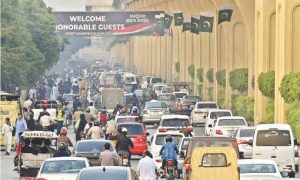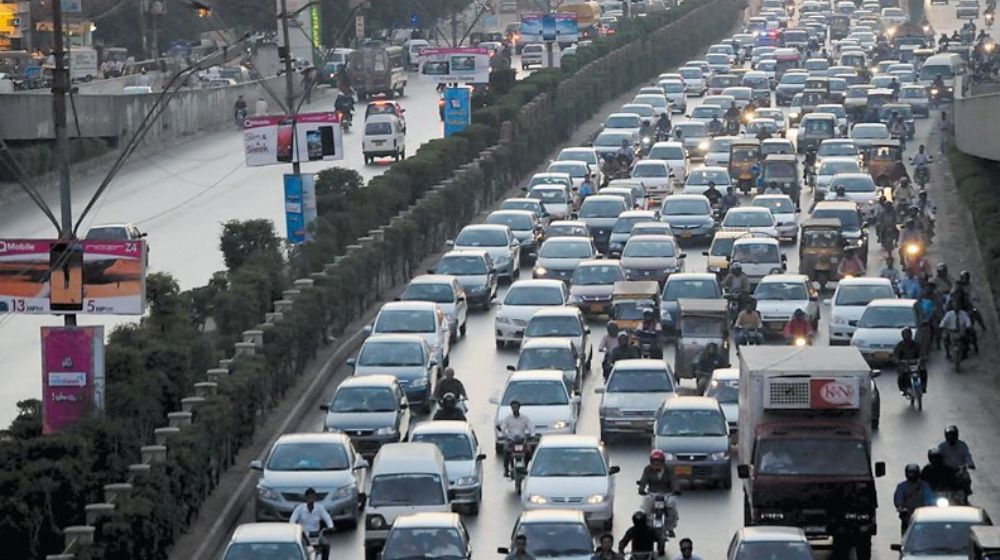As Katchery Chowk’s chaotic construction collides with Rawalpindi’s cricket frenzy, the twin cities descend into a man-made crisis—exposing arrogance, indiscipline, and the absence of common sense in urban governance.

Muhammad Arif
This article follows my earlier piece, “Traffic Mania – Adopt International Practices or at Least Use Common Sense,” published on 6 November 2025. It is motivated by the worsening traffic chaos, the upcoming cricket series, and my personal ordeal on 8 November 2025—an experience that revealed how civic indifference and administrative arrogance have turned daily life in the twin cities into public punishment.
The people of Rawalpindi and Islamabad are not being governed; they are being tormented. As if the Katchery Chowk bridge construction had not already crippled mobility, the upcoming cricket series from 9 to 19 November will multiply the agony. For the satisfaction of bureaucratic egos and the thrill of spectacle, citizens are being subjected to what can only be described as planned torture or civil cruelty.
Every morning and evening, commuters crawl through a suffocating nightmare of barricades, horns, fumes, and gridlocked intersections. What should have been a 15-minute drive now takes hours. The bridge project—poorly sequenced and miserably managed—has drained the city of patience, productivity, and sanity. And now, instead of relief, the administration has chosen to host cricket matches that will bring additional security cordons, road closures, and diversions, paralyzing every corridor linking Islamabad and Rawalpindi.
After this scribe invited the attention of the Rawalpindi administration to the need for improving traffic flow, my own vehicle was unjustifiably, illegally, and forcibly removed in my absence—on the order of an Army Havaldar posted nearly half a kilometre away. The car was properly parked, creating no hazard or obstruction. Such arbitrary high-handedness exposes a deeper rot—an environment where authority is exercised not with responsibility but with arrogance. When citizens who speak up for order are punished instead of heard, what hope remains for ordinary commuters?
The result of this mismanagement is visible everywhere. One traffic choke point alone already wastes three to four hours of commuter time daily. Imagine the torment when two major disruptions—the Katchery Chowk construction zone and the cricket stadium—operate simultaneously within barely 10 to 12 kilometres. The result will be a complete lockdown of mobility across both cities. Hospitals, offices, courts, and schools will be crippled. For the joy of seeing the public in misery, entire working days will be lost to fumes and frustration. This is not an accident but a preventable act of negligence.
The economic cost of this chaos is staggering. A vehicle idling for 30 minutes consumes about one litre of fuel, depending on the engine. Multiplied by tens of thousands of vehicles stuck daily, the loss runs into tens of thousands of litres. Add the wasted man-hours, late arrivals, and missed appointments, and the total cost easily reaches billions of rupees every month. A country already battling fiscal stress and energy shortages simply cannot afford to burn imported fuel in traffic jams created by official incompetence.
Globally, urban projects of far greater scale are executed under traffic ten times heavier than Rawalpindi’s, but they are managed through discipline and planning. International best practices require a Traffic Management Plan (TMP) before any construction begins. The TMP sets work sequencing, detours, signage, and communication with the public. Here, there is no such concept—only barricades erected overnight, lanes sealed without notice, and wardens left to improvise amid chaos.
Common sense can still rescue the situation. Either shift the cricket series to another city—Multan, Karachi, or Faisalabad—where infrastructure and traffic management can handle large crowds, or immediately suspend all construction activity at Katchery Chowk from 9 to 19 November. Even a brief pause would spare the public unmanageable congestion and signal that the administration values citizens’ time and well-being.
Simultaneously, the authorities must establish a 24-hour Traffic Control Cell jointly run by the RDA, City Traffic Police, and district administration to issue real-time route updates, diversions, and congestion alerts. Increased communication can significantly reduce confusion and road rage. The number of wardens should be increased tenfold during the cricket series to correct reckless and ill-mannered drivers whose impatience compounds the problem. The government must also impose strict penalties on contractors who keep lanes closed without active work.
Most importantly, no road, exit, or entry point should ever be completely blocked. The right of way may be reduced—three lanes to two, or two to one—but traffic must continue to move, however slowly. This simple principle, universally followed in developed countries, keeps life moving even during heavy construction. With adequate manpower, better signage, and strict enforcement, this one measure alone could dramatically reduce public misery.
Equally essential is the elimination of VIP stoppages. No modern city halts its citizens for convoys. If security demands special arrangements, use rolling corridors or helicopters. The privilege of office should never come at the expense of the public’s right to movement. Every minute of stoppage adds up to thousands of hours of lost productivity and millions in wasted fuel.
Governance, in its true sense, means managing public life efficiently and respectfully. Yet what we witness is the opposite: disregard for planning, absence of empathy, and contempt for public convenience. Development that destroys mobility is not progress—it is regression. Cricket that paralyzes a population is not celebration—it is arrogance.
Rawalpindi’s administration must rise above the habit of managing by reaction. It must plan, coordinate, and communicate like a city that belongs in the 21st century. Citizens have endured months of avoidable agony. They deserve roads that move, institutions that listen, and officials who understand that power is a responsibility, not a license to inconvenience.
Ultimately, it is all about attitude and care. Even small acts of consideration can trigger a soft revolution in society. If my vehicle truly needed to be removed, it could have been parked at a nearby empty space rather than dumped elsewhere, forcing me to waste hours locating it. When questioned, the lifter operator apologized, admitting that he was acting on the orders of an Army Havaldar who had instructed its placement on the footpath. Such disregard for basic civility reflects how indifference has become institutions which are meant to serve the public. The haste with which mega projects are executed raises serious doubts about motives — as if speed matters only to secure one’s share, not to ensure quality or public convenience. Progress and speed without compassion is civic cruelty in motion.
(Opinions expressed in this article are the author’s own and do not necessarily reflect WNAM’s editorial policy)
The writer is: Former Member (Gas), OGRA; Managing Partner, Arif & Associates; Petroleum Law Specialist; Thought Leader in Energy, Governance, and Consumer Rights Advocacy. Email: [email protected] | Cell: 0333-5191381


